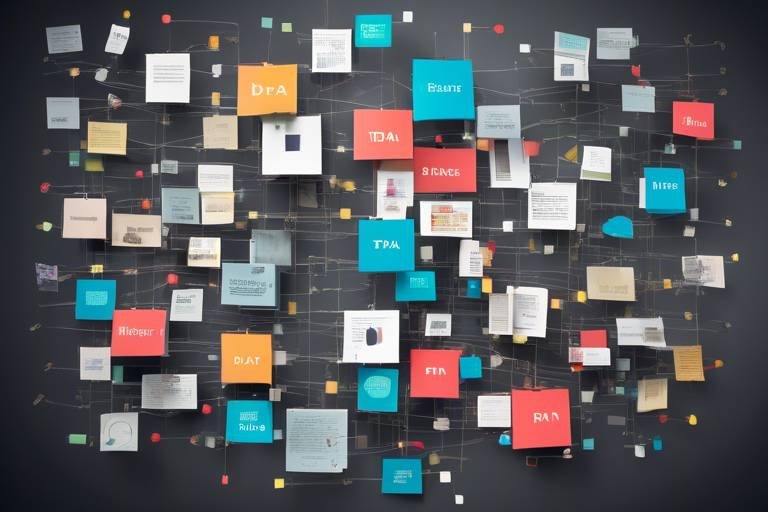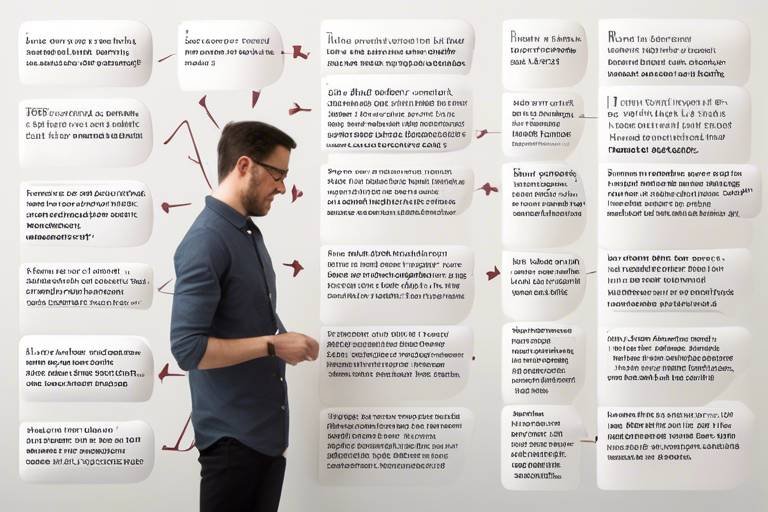The Science of Utilizing Reflexivity in Qualitative Research
In the ever-evolving landscape of qualitative research, the concept of reflexivity stands out as a beacon of integrity and depth. But what exactly is reflexivity? It’s more than just a buzzword; it’s a critical approach that allows researchers to peel back the layers of their own biases and influences, ultimately leading to richer and more authentic findings. Imagine stepping into a pool of water—each ripple representing your thoughts, experiences, and assumptions. Reflexivity invites you to dive deeper, encouraging you to explore how these ripples affect the overall picture of your research.
By embracing reflexivity, researchers can foster a more transparent and ethical approach to data collection and interpretation. It’s like putting on a pair of glasses that allows you to see not only the research subject but also your own reflections in the glass. This self-awareness is crucial, as it helps to mitigate the risk of imposing personal biases onto participants’ voices. In qualitative research, where the richness of data often comes from personal narratives and subjective experiences, maintaining this balance is essential.
Moreover, reflexivity is not a one-time act; it’s an ongoing practice that weaves itself throughout the research process. From the initial stages of designing a study to the final interpretations of data, reflexivity acts as a guiding principle. Researchers are encouraged to continuously reflect on their positionality—who they are, what they bring to the table, and how their presence might shape the research environment. This reflection is not just a formality; it’s a vital component that enhances the credibility and trustworthiness of qualitative research.
As we delve deeper into the methods and implications of reflexivity, we will uncover the various tools and practices that can be employed to enhance this critical aspect of qualitative research. By doing so, we not only enrich our own understanding but also honor the voices of those we study. So, let’s embark on this journey of self-discovery and ethical engagement, ensuring that our research contributes meaningfully to the broader landscape of knowledge.
Reflexivity is crucial in qualitative research as it allows researchers to acknowledge their biases and influences, fostering a more transparent and ethical approach to data collection and interpretation.
Various methods can be employed to practice reflexivity, including journaling, peer debriefing, and self-interviews, which help researchers critically examine their perspectives and assumptions throughout the research process.
Journaling encourages researchers to document their thoughts, feelings, and experiences, providing a space for reflection that can lead to deeper insights and more nuanced interpretations of the data.
Engaging with peers for feedback allows researchers to gain alternative perspectives, challenging their views and enhancing the rigor of their qualitative analysis through collaborative reflexivity.
Conducting self-interviews enables researchers to explore their motivations, biases, and emotional responses, facilitating a more profound understanding of how these factors influence their research.
Reflexivity plays a vital role in data interpretation by encouraging researchers to critically engage with their findings, ensuring that personal biases do not overshadow the voices of participants.
Ethical considerations in qualitative research are deeply intertwined with reflexivity, as researchers must navigate their positionality and the impact of their presence on participants and the research context.
Understanding power dynamics is essential for ethical reflexivity, as researchers must be aware of how their social identities and relationships with participants can influence the research process and outcomes.
Striking a balance between subjectivity and objectivity is crucial in qualitative research, as reflexivity allows researchers to acknowledge their perspectives while striving for a fair representation of participant experiences.
- What is reflexivity in qualitative research? Reflexivity refers to the process of reflecting on one’s own biases, perspectives, and influences throughout the research process.
- Why is reflexivity important? It enhances the transparency and ethical integrity of research, ensuring that personal biases do not overshadow participant voices.
- What methods can be used for reflexivity? Common methods include journaling, peer debriefing, and conducting self-interviews.
- How does reflexivity impact data interpretation? It encourages researchers to critically engage with their findings, leading to more nuanced and accurate interpretations.

The Importance of Reflexivity
Reflexivity is an essential cornerstone in the realm of qualitative research. It serves as a mirror, reflecting not only the data collected but also the researcher’s own biases, experiences, and perspectives. Why is this so important, you may ask? Well, the simple truth is that every researcher brings a unique lens through which they view the world, and this lens can significantly influence the interpretation of findings. By embracing reflexivity, researchers can foster a more transparent and ethical approach to their work, which ultimately enhances the integrity of their research.
Consider reflexivity as a dance between the researcher and the participants. Just as dancers must be aware of their movements and the space they occupy, researchers must be cognizant of their positionality and how it shapes the research context. This awareness allows for a deeper connection with participants, leading to richer data collection and analysis. Moreover, reflexivity encourages researchers to ask critical questions about their role in the research process:
- What assumptions am I bringing into this study?
- How might my background affect my interactions with participants?
- In what ways could my biases color the interpretation of the data?
By addressing these questions, researchers can cultivate a more nuanced understanding of their findings, ensuring that the voices of participants are not overshadowed by personal biases. Furthermore, reflexivity promotes a culture of continuous learning and growth, as researchers engage in self-reflection and seek feedback from peers. This practice not only enriches the research process but also contributes to the broader academic discourse.
In essence, the importance of reflexivity lies in its ability to enhance the quality and depth of qualitative research. It challenges researchers to step outside their comfort zones, confront their biases, and engage with the complexities of human experience. By doing so, they can produce work that is not only ethically sound but also deeply insightful, paving the way for more meaningful contributions to the field.

When it comes to qualitative research, reflexivity isn't just a buzzword; it's a fundamental practice that can drastically enhance the quality of your findings. Researchers often grapple with their own biases, preconceptions, and emotional responses, which can cloud their judgment and skew their interpretations. To combat this, there are several effective methods of reflexive practice that can help researchers maintain a clear and unbiased perspective throughout their research journey. These methods encourage a continuous dialogue between the researcher and their data, fostering a deeper understanding of both the subject matter and their own positionality.
One of the most popular methods is journaling. Think of it as a personal diary where researchers can document their thoughts, feelings, and reactions to their research experiences. By regularly jotting down insights, researchers can reflect on their evolving perspectives and recognize any biases that may arise during the data collection process. This practice not only aids in self-awareness but also contributes to a richer analysis of the data, as researchers can trace how their thoughts have shifted over time.
Another valuable technique is peer debriefing. Engaging with colleagues or mentors can provide a fresh lens through which to view the research. This collaborative approach allows researchers to challenge their assumptions and consider alternative interpretations of their data. The feedback gained from peers can be instrumental in enhancing the rigor of qualitative analysis, as it introduces diverse viewpoints that might otherwise be overlooked. It's like having a sounding board; sometimes, just hearing another perspective can illuminate aspects of the research that were previously shrouded in personal bias.
Self-interviews are also a powerful reflexive tool. By asking themselves probing questions, researchers can delve into their motivations, biases, and emotional reactions to the research process. This technique not only uncovers underlying influences that shape their interpretations but also promotes a deeper connection with the research topic. Imagine sitting down for a heart-to-heart with yourself, exploring the 'why' behind your research choices—this can lead to profound insights that enhance the overall integrity of the study.
In summary, employing methods such as journaling, peer debriefing, and self-interviews can significantly enrich the reflexive practice in qualitative research. These techniques not only help researchers maintain objectivity but also foster a more profound engagement with their data, ultimately leading to findings that are both credible and impactful. By embracing reflexivity, researchers can ensure that their work remains ethical, transparent, and deeply insightful.
- What is reflexivity in qualitative research? Reflexivity involves recognizing and reflecting on the researcher’s own biases and influences throughout the research process.
- Why is reflexivity important? It enhances the transparency and integrity of the research, ensuring that personal biases do not overshadow participant voices.
- What methods can be used for reflexivity? Common methods include journaling, peer debriefing, and self-interviews.
- How does peer debriefing work? It involves discussing your research with colleagues to gain alternative perspectives and challenge your assumptions.
- Can reflexivity improve data interpretation? Yes, it encourages critical engagement with findings, leading to more nuanced interpretations.

Journaling is more than just a way to jot down thoughts; it's a powerful reflexive tool that can significantly enhance qualitative research. Imagine having a personal space where you can freely express your thoughts, feelings, and insights without the fear of judgment. This is what journaling offers researchers—a sanctuary for reflection. When researchers document their experiences, they create a rich tapestry of their journey, capturing both the highs and lows of the research process. This practice not only aids in self-discovery but also allows researchers to track how their perspectives evolve over time.
Through journaling, researchers can engage in a dialogue with themselves, questioning their assumptions and biases. For instance, when faced with a challenging interview, a researcher might write about their emotional responses and the factors contributing to those feelings. This reflection can reveal underlying biases that may affect data interpretation, ultimately leading to more nuanced and ethical research outcomes. Moreover, journaling encourages a deeper connection to the research topic, as it allows researchers to explore their motivations and the emotional landscape that influences their work.
Additionally, journaling can serve as a valuable resource during the analysis phase of qualitative research. By revisiting their entries, researchers can identify patterns in their thoughts and emotions that may align with or contradict their findings. This process not only enriches the analysis but also reinforces the importance of reflexivity in maintaining the integrity of the research. In this way, journaling acts as both a mirror and a map, reflecting the researcher's journey while guiding them toward a more comprehensive understanding of their work.
Incorporating journaling into the research process can be as straightforward as setting aside a few minutes each day to write. Researchers might consider the following tips to make the most of their journaling practice:
- Be Consistent: Set a regular time for journaling to establish a routine.
- Write Freely: Allow thoughts to flow without worrying about grammar or structure.
- Reflect on Experiences: After interviews or observations, take time to note your feelings and insights.
- Review Regularly: Periodically revisit your entries to identify patterns and shifts in perspective.
Ultimately, journaling not only fosters personal growth but also enhances the quality of qualitative research. By embracing this reflexive practice, researchers can cultivate a deeper understanding of their positionality and its impact on their work, making their findings richer and more authentic.
- What is reflexivity in qualitative research? Reflexivity refers to the process by which researchers reflect on their biases, perspectives, and influence on the research process, ensuring a more ethical and transparent approach.
- How does journaling help in qualitative research? Journaling allows researchers to document their thoughts and feelings, facilitating reflection that can lead to deeper insights and a better understanding of their biases.
- Can I use journaling in other types of research? Absolutely! While it's particularly beneficial in qualitative research, journaling can enhance reflexivity and self-awareness in various research contexts.

Engaging with peers for feedback is not just a good practice; it's a transformative experience that can significantly enhance the quality of qualitative research. Imagine standing in front of a mirror, but instead of just seeing your reflection, you have a group of friends offering insights and critiques. This collaborative approach allows researchers to step outside their own perspectives, seeing their work through the eyes of others. When researchers share their findings or methods with peers, they open themselves up to diverse interpretations and suggestions that they might not have considered on their own.
One of the most powerful aspects of peer feedback is its ability to challenge preconceived notions. For instance, when a researcher presents their data analysis, a colleague might point out a bias that the researcher didn't notice. This kind of feedback not only helps in refining the research but also fosters a culture of critical thinking and intellectual humility. By acknowledging that others may see things differently, researchers can cultivate a more rounded understanding of their work.
Moreover, peer debriefing can take various forms, such as informal discussions, formal presentations, or structured feedback sessions. Each method has its own advantages. For example, informal discussions can lead to spontaneous and honest feedback, while formal presentations may help in organizing thoughts and arguments more clearly. Regardless of the format, the key is to create an environment where open communication is encouraged, allowing all participants to voice their opinions freely.
Additionally, documenting the feedback received during these sessions is crucial. This can be done through reflexive journaling, where researchers note not only the feedback itself but also their emotional responses to it. This practice can reveal patterns in the feedback that might highlight areas needing further exploration or adjustment. By integrating this feedback into their research process, researchers can enhance the integrity and depth of their findings, ensuring that they are not only reflecting their own biases but also genuinely representing the voices of their participants.
In summary, incorporating feedback from peers is a vital aspect of reflexivity in qualitative research. It is a process that enriches the researcher's perspective, enhances the rigor of the analysis, and ultimately contributes to producing more reliable and credible findings. The collaborative nature of this practice not only benefits the individual researcher but also elevates the entire research community by promoting a culture of shared learning and improvement.
- What is reflexivity in qualitative research? Reflexivity refers to the process of reflecting on one's own biases, influences, and assumptions throughout the research process to enhance the integrity and depth of findings.
- How can peer feedback improve qualitative research? Peer feedback provides alternative perspectives that can challenge biases, enhance critical thinking, and contribute to a more rigorous analysis of the data.
- What are some methods to practice reflexivity? Methods include journaling, peer debriefing, and conducting self-interviews, all of which help researchers critically examine their perspectives.
- Why is ethical reflexivity important? Ethical reflexivity is crucial as it helps researchers navigate their positionality and understand how their presence can impact the research context and participants.

Conducting self-interviews is a powerful method for researchers to delve into their own motivations, biases, and emotional responses. Imagine sitting down with yourself as if you're interviewing a close friend, but instead, you're uncovering the layers of your own thoughts and feelings about the research at hand. This introspective approach not only promotes self-awareness but also enhances the overall quality of the research by allowing you to critically assess how your personal experiences shape your interpretations.
Through self-interviews, researchers can explore several key areas:
- Personal Motivations: What drives you to conduct this research? Understanding your motivations can provide insight into how they may influence your findings.
- Bias Identification: Are there any preconceived notions that you hold? Acknowledging these biases is crucial for maintaining the integrity of your research.
- Emotional Responses: How do you feel about the topics or participants involved? Recognizing your emotional responses can help you navigate the complexities of the research process.
Engaging in self-interviews can take various forms, from structured question-and-answer sessions to more free-form conversations with oneself. Researchers can start with specific questions such as:
- What assumptions do I have about this research topic? - How might my background influence my perspective? - What are my expectations for the outcomes of this research?
By documenting these self-interviews, researchers create a valuable resource for reflection throughout the research process. This practice not only encourages deeper insights but also fosters a sense of accountability. When researchers revisit their self-interview notes, they can better understand how their perspectives have evolved, ensuring that they remain aligned with the voices of the participants rather than overshadowed by their own biases.
In essence, self-interviews serve as a mirror, reflecting both the researcher’s internal landscape and the broader research context. This method empowers researchers to embrace their subjectivity while striving for a balanced representation of participant experiences. The result? A richer, more nuanced understanding that ultimately enhances the integrity of qualitative research.
- What is reflexivity in qualitative research? Reflexivity refers to the process of reflecting on one’s own biases, perspectives, and influence on the research process and outcomes.
- How can self-interviews improve my research? Self-interviews can help you uncover personal biases, motivations, and emotional responses, leading to a more profound understanding of your research context.
- Are self-interviews suitable for all types of qualitative research? While particularly beneficial in qualitative research, self-interviews can be adapted to various research methodologies where researcher perspective plays a significant role.

When it comes to qualitative research, the role of reflexivity in data interpretation is nothing short of transformative. It acts as a lens through which researchers can examine their findings, ensuring that personal biases do not obscure the authentic voices of participants. Imagine stepping into a gallery filled with paintings; each piece tells a story, but if you're wearing tinted glasses, you might miss the true colors of the art. Similarly, reflexivity helps researchers remove those tinted glasses, allowing for a clearer view of the data at hand.
By engaging in reflexive practices, researchers can critically assess their own positions and influences throughout the research process. This self-awareness fosters a deeper understanding of how their backgrounds, beliefs, and experiences shape their interpretations. For instance, a researcher studying educational disparities may have their own experiences with privilege or marginalization that could color their analysis. Recognizing these influences is crucial in maintaining the integrity of the research.
Moreover, reflexivity encourages an iterative approach to data interpretation. Researchers are not just passive observers; they are active participants in the research landscape. As they analyze the data, they must continuously reflect on how their interpretations evolve in response to new insights. This dynamic process can lead to more nuanced and richer interpretations, illuminating aspects of the data that might have been overlooked without such introspection.
To illustrate this further, consider the following table that outlines the key aspects of reflexivity in data interpretation:
| Aspect | Description |
|---|---|
| Self-awareness | Recognizing personal biases and how they affect interpretations. |
| Iterative Process | Continuously reflecting on data as new insights emerge. |
| Engagement with Data | Actively interacting with the data rather than remaining passive. |
| Ethical Considerations | Understanding the impact of the researcher's presence on participants. |
Ultimately, reflexivity in data interpretation is not merely a methodological tool; it is a vital component that enriches the overall research process. It pushes researchers to ask themselves challenging questions, such as: “How might my background influence my understanding of this data?” or “Am I giving enough space for participants’ voices to shine through?” These questions pave the way for more ethical and responsible research practices, allowing for a deeper connection to the participants and their narratives.
In conclusion, embracing reflexivity in qualitative research is akin to embarking on a journey of self-discovery. It empowers researchers to delve into their own thoughts and feelings while navigating the intricate web of human experiences. By doing so, they not only enhance the quality of their findings but also contribute to a richer understanding of the social world around them.
- What is reflexivity in qualitative research?
Reflexivity involves researchers reflecting on their own biases and influences throughout the research process to enhance the integrity of their findings. - Why is reflexivity important?
It helps ensure that personal biases do not overshadow the voices of participants, leading to more accurate and ethical interpretations of data. - How can researchers practice reflexivity?
Methods include journaling, peer debriefing, and conducting self-interviews, all of which encourage critical self-examination. - What role does reflexivity play in data interpretation?
It allows researchers to critically engage with their findings, ensuring a clearer understanding of the data and a fair representation of participant experiences.

In the realm of qualitative research, ethical considerations are paramount, and they are intricately linked to the concept of reflexivity. When researchers engage in reflexive practice, they embark on a journey of self-discovery that allows them to better understand their positionality. This understanding is crucial as it shapes how researchers interact with participants and interpret data. By acknowledging their own biases, backgrounds, and influences, researchers can create a more transparent and ethical framework for their studies.
One of the key ethical dilemmas in qualitative research revolves around the impact of the researcher’s presence on the participants and the research context. For instance, a researcher’s social identity—such as their race, gender, or socioeconomic status—can significantly affect the dynamics of the research environment. This is where reflexivity becomes a powerful tool. It encourages researchers to critically examine not just their personal biases but also the power dynamics at play. Understanding these dynamics is essential for conducting ethical research that respects the voices and experiences of participants.
Moreover, reflexivity compels researchers to consider how their own experiences and emotions might shape their interpretations of the data. This self-awareness can prevent the overshadowing of participant voices by the researcher’s perspectives. In qualitative research, it’s vital to balance subjectivity and objectivity. Reflexivity allows researchers to acknowledge their subjective experiences while striving for an accurate representation of participant narratives. This balance is not always easy to achieve, but it is essential for maintaining the integrity of the research.
To further illustrate the interplay between reflexivity and ethics, consider the following table that outlines some common ethical considerations in qualitative research and how reflexivity can address them:
| Ethical Consideration | How Reflexivity Helps |
|---|---|
| Informed Consent | Reflexivity encourages transparency about the researcher's role and intentions, fostering trust with participants. |
| Power Imbalances | By acknowledging their own power and privilege, researchers can work to mitigate these imbalances in the research setting. |
| Data Interpretation | Reflexivity prompts researchers to critically engage with their findings, ensuring participant voices are prioritized. |
| Confidentiality | Reflexive practice includes a commitment to protecting participant identities and data throughout the research process. |
In summary, reflexivity is not just a methodological tool; it is a fundamental aspect of conducting ethical qualitative research. By engaging in reflexive practices, researchers can navigate the complex terrain of ethical considerations, ensuring that their work is not only rigorous but also respectful and responsible. This commitment to reflexivity ultimately enhances the quality and integrity of qualitative research, making it a more trustworthy source of knowledge.
- What is reflexivity in qualitative research? Reflexivity refers to the process by which researchers critically examine their own biases, perspectives, and influences throughout the research process.
- Why is reflexivity important? Reflexivity is important because it helps researchers acknowledge their positionality, which enhances the transparency and ethical integrity of their work.
- How can researchers practice reflexivity? Researchers can practice reflexivity through methods such as journaling, peer debriefing, and conducting self-interviews.
- What are the ethical implications of reflexivity? Reflexivity allows researchers to navigate power dynamics, ensuring that participant voices are prioritized and ethical considerations are respected.

Navigating power dynamics in qualitative research is not just a procedural necessity; it’s a fundamental aspect that shapes the entire research experience. Imagine walking into a room filled with individuals who have lived experiences vastly different from your own. As a researcher, your role is not merely to observe but to engage, listen, and interpret their stories. However, this engagement is layered with complexities, primarily due to the inherent power imbalances that exist between researchers and participants. These dynamics can stem from various sources, including social identities, cultural backgrounds, and even the institutional affiliations of the researcher.
Understanding these dynamics is essential for ethical reflexivity. It requires researchers to critically examine their own social positions and how these positions might influence the research process. For instance, a researcher from a privileged background may inadvertently impose their perspectives on participants, overshadowing their voices. This is where the concept of **positionality** comes into play, which refers to the acknowledgment of one’s social and political context in relation to the research. By recognizing their positionality, researchers can actively work to mitigate the impact of their biases and ensure a more equitable research environment.
Moreover, power dynamics can also manifest in the way participants respond to researchers. Some may feel intimidated, while others might see the researcher as an authority figure, leading to responses that are not entirely genuine. To address this, researchers can adopt strategies such as building rapport and trust with participants, which can help level the playing field. Engaging in open dialogues and demonstrating genuine interest in participants' stories can create a more comfortable atmosphere, encouraging authentic responses. It’s about transforming the researcher-participant relationship from one of **hierarchy** to one of **collaboration**.
Here are some key strategies to navigate power dynamics effectively:
- Active Listening: Show genuine interest in participants' narratives, ensuring they feel heard.
- Transparency: Be open about your research intentions and how the data will be used.
- Empathy: Approach each participant's experience with compassion and understanding.
- Co-creation: Involve participants in the research process, allowing them to contribute to the direction of the study.
By implementing these strategies, researchers can foster a more inclusive environment that acknowledges and respects the voices of participants. This, in turn, enriches the data collected and enhances the overall quality of the research. Remember, navigating power dynamics is not a one-time task but an ongoing process that requires constant reflection and adjustment throughout the research journey.
Q1: What is reflexivity in qualitative research?
A1: Reflexivity involves researchers acknowledging their biases and influences, which fosters transparency and ethical practices in data collection and interpretation.
Q2: How can power dynamics affect qualitative research?
A2: Power dynamics can influence how participants engage with researchers, potentially leading to biased or inauthentic data if not addressed appropriately.
Q3: What are some methods to practice reflexivity?
A3: Methods include journaling, peer debriefing, and conducting self-interviews to critically examine one’s own perspectives and assumptions throughout the research process.
Q4: Why is it important to balance subjectivity and objectivity?
A4: Balancing subjectivity and objectivity is crucial to ensure that researchers acknowledge their perspectives while striving to fairly represent participant experiences.

In the realm of qualitative research, the delicate dance between subjectivity and objectivity is akin to walking a tightrope. It’s a balancing act that requires researchers to be acutely aware of their own perspectives while striving to represent the voices of participants authentically. This balance is not just a methodological necessity; it is a fundamental ethical obligation that enhances the credibility of the research findings.
Subjectivity in qualitative research refers to the personal experiences, feelings, and biases that a researcher brings to the study. These elements can color the interpretation of the data, leading to insights that are rich and profound but may also skew the representation of participants' realities. On the other hand, objectivity is about maintaining a distance from personal biases and ensuring that the analysis reflects the participants' perspectives without distortion. So, how can researchers navigate this intricate landscape?
One effective approach is through the practice of reflexivity, which encourages researchers to regularly examine their own biases and assumptions. By doing so, they can identify how their backgrounds, values, and experiences might influence their research. For instance, a researcher who has experienced similar challenges as their participants may have a deeper understanding of their narratives but must also be cautious not to project their experiences onto the data. This is where reflexive journaling becomes invaluable, as it allows researchers to document their thoughts and feelings throughout the research process, fostering a clearer understanding of their positionality.
Furthermore, engaging in discussions with peers can provide alternative viewpoints that challenge a researcher’s assumptions. This collaborative reflexivity not only enhances the rigor of the analysis but also helps in mitigating biases. When researchers share their interpretations with colleagues, they can receive constructive feedback that prompts them to reconsider their conclusions and refine their understanding. It's like having a trusted friend who gently nudges you to see a different angle of a situation you thought you understood completely.
Moreover, researchers should strive to create a transparent narrative that acknowledges their subjectivity while presenting the data. This can be achieved by explicitly stating their positionality in the research report and discussing how it might influence the findings. By doing so, they invite readers to critically engage with the research, fostering a deeper understanding of the context. In essence, researchers should aim to strike a balance where their unique insights enrich the research without overshadowing the participants' voices.
In conclusion, balancing subjectivity and objectivity in qualitative research is not merely an academic exercise; it’s a necessary practice that enhances the integrity and depth of research findings. By embracing reflexivity, engaging with peers, and maintaining transparency, researchers can navigate this complex terrain effectively, ultimately leading to richer and more authentic representations of the lived experiences of their participants.
- What is reflexivity in qualitative research? Reflexivity involves researchers critically examining their own biases, influences, and perspectives throughout the research process to enhance the integrity of their findings.
- How can journaling help in reflexivity? Journaling allows researchers to document their thoughts and feelings, facilitating deeper insights and a more nuanced understanding of their research context.
- Why is it important to balance subjectivity and objectivity? Balancing these elements ensures that researchers can offer rich insights while also accurately representing participant experiences without distortion.
- What role do peer discussions play in reflexivity? Engaging with peers can provide alternative viewpoints, challenge assumptions, and enhance the rigor of qualitative analysis.
Frequently Asked Questions
- What is reflexivity in qualitative research?
Reflexivity in qualitative research refers to the process by which researchers acknowledge and reflect on their own biases, perspectives, and influences throughout the research process. This self-awareness enhances the integrity and depth of the findings, allowing for a more transparent approach to data collection and interpretation.
- Why is reflexivity important in qualitative research?
Reflexivity is crucial because it helps researchers to recognize their own positionality and how it affects their interactions with participants and the data. By being aware of their biases, researchers can strive for a more ethical and accurate representation of participant experiences, ultimately leading to richer insights.
- What methods can be used to practice reflexivity?
Several methods can be employed to practice reflexivity, including journaling, peer debriefing, and self-interviews. These techniques encourage researchers to critically examine their assumptions and perspectives, promoting deeper insights and enhancing the rigor of their qualitative analysis.
- How does journaling contribute to reflexivity?
Journaling serves as a reflective tool for researchers, allowing them to document their thoughts, feelings, and experiences related to the research. This practice can lead to greater self-awareness and nuanced interpretations of the data, as researchers can revisit their reflections throughout the research process.
- What role does peer feedback play in reflexive practice?
Engaging with peers for feedback is vital as it provides alternative perspectives that challenge researchers' views. This collaborative reflexivity enhances the rigor of qualitative analysis and ensures that researchers consider diverse viewpoints, which can lead to improved interpretations of the data.
- How can self-interviews help researchers?
Conducting self-interviews allows researchers to delve into their motivations, biases, and emotional responses. This exploration facilitates a deeper understanding of how these factors influence their research, ultimately leading to more thoughtful and informed interpretations of the findings.
- What ethical considerations are linked to reflexivity?
Ethical considerations in qualitative research are closely tied to reflexivity. Researchers must navigate their positionality and understand how their presence impacts participants and the research context. This awareness helps ensure that the research is conducted ethically and respectfully.
- How can researchers navigate power dynamics in reflexivity?
Understanding power dynamics is essential for ethical reflexivity. Researchers must be aware of their social identities and how these may influence their relationships with participants. By acknowledging these dynamics, researchers can work towards a more equitable research process.
- How do researchers balance subjectivity and objectivity?
Striking a balance between subjectivity and objectivity is crucial in qualitative research. Reflexivity allows researchers to acknowledge their perspectives while striving for a fair representation of participant experiences, ensuring that personal biases do not overshadow the voices of those being studied.



















